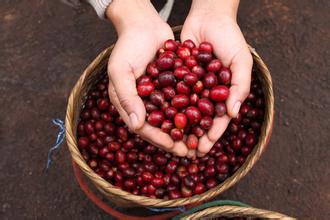Kenyan coffee treatment method
Coffee trees in Kenya are mostly planted at 1400 m-2000 m above sea level, and the growth areas include Ruiri, Thika, Kirinyaga and Mt. Kenya West, Nyeri, Kiambu and Muranga. Mainly in the foothills of Mt.Kenya and Aberdare. There are many producing areas in Kenya that strive to preserve the native forest ecosystem, protect the natural gene pool, support the reproduction of wild coffee varieties and breed a variety of coffee trees.
The unique Kenyan varieties SL28 and SL34, which were cultivated and named by the "Scott Laboratories" laboratory in 1930, were born in such a good environment. According to botanists in SL laboratory, SL28 and SL34 are genetic variants.
Among them, SL28 has a mixed pedigree of French missionaries, mocha and Yemeni Tibica. The goal of cultivating SL28 was to mass produce coffee beans with high quality and resistance to diseases and insect pests. Although the yield of SL28 was not as high as expected, the copper leaf color and broad bean-shaped beans have great sweetness, balance and complex flavor, as well as remarkable citrus and plum characteristics. SL34 is similar to SL28 in flavor, with a heavier, fuller and cleaner finish than SL28, except for the complex acidity and great sweetness of the finish. SL34 has French missionaries, bourbon, and more Tibica ancestry. Dou looks similar to SL28, but is more adaptable to sudden heavy rain. It is these two important varieties that lead us to the unique Kenyan style: strong acidity, rich taste and beautiful balance.
Rare micro-batch boutique coffee, from Kenya's Kakentu processing plant (Kenya Gakundu), select each bean, and by the Kenyan multi-door DORMAN company to ensure the superiority of quality.
Multi-door DORMAN is known for its excellent quality management, providing coffee from all regions of Kenya and Tanzania in addition to strict product control. With sustainable development and ethical procurement as their business strategy, the company buys environmentally friendly farms in the planting process and raw bean treatment at a fair price and awards awards to good farms and cooperatives. In order to ensure the safety and quality of products before export, DORMAN also has factories, warehouses and processing plants in Nairobi, Moshi and Dar es Salaam, and carries out quality management of all raw beans at headquarters Nairobi. Here, about 1500 cups of coffee are tested and evaluated by a professional team every week to select the best coffee for customers around the world.

Important Notice :
前街咖啡 FrontStreet Coffee has moved to new addredd:
FrontStreet Coffee Address: 315,Donghua East Road,GuangZhou
Tel:020 38364473
- Prev

Characteristics of Ethiopian Yega Xuefei Coffee
At first, Yejassefi's coffee trees were planted by European monks, and later by farmers or cooperatives. Yega Xuefei is actually constructed by the surrounding coffee communities or cooperatives, including: Hafusha, Hama, Biloya. These mountain villages are foggy, like spring all the year round, with a gentle breeze in summer, cool but not hot, rain but not damp, and no cold damage in winter.
- Next

Introduction to the place of origin of the historical name of mocha coffee beans
The characteristics of mocha coffee Ethiopia is known as the birthplace of coffee. Ethiopia has a history of coffee origin and a traditional agricultural country. It is most famous for its mocha-Mocha coffee. In the West, mocha coffee is not only the name of the coffee variety, but also refers to the method of brewing coffee or the utensils for brewing coffee and special conditioning methods. Mocha coffee beans are mostly dried.
Related
- Does Rose Summer choose Blue, Green or Red? Detailed explanation of Rose Summer Coffee plots and Classification in Panamanian Jade Manor
- What is the difference between the origin, producing area, processing plant, cooperative and manor of coffee beans?
- How fine does the espresso powder fit? how to grind the espresso?
- Sca coffee roasting degree color card coffee roasting degree 8 roasting color values what do you mean?
- The practice of lattes: how to make lattes at home
- Introduction to Indonesian Fine Coffee beans-- Java Coffee producing area of Indonesian Arabica Coffee
- How much will the flavor of light and medium roasted rose summer be expressed? What baking level is rose summer suitable for?
- Introduction to the characteristics of washing, sun-drying or wet-planing coffee commonly used in Mantenin, Indonesia
- Price characteristics of Arabica Coffee Bean Starbucks introduction to Manning Coffee Bean Taste producing area Variety Manor
- What is the authentic Yega flavor? What are the flavor characteristics of the really excellent Yejasuffi coffee beans?

